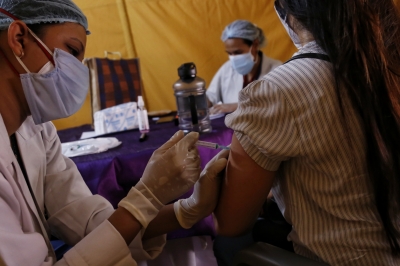Food Inflation
The Indian economy faces a multifaceted challenge as food prices continue to rise, exerting significant pressure on households and policymakers alike.
Early this month, the government has said that there will be enough doses by mid-July or August to vaccinate one crore people per day.

The country’s Covid curve can be flattened by July end if the government is able to vaccinate a whopping 90-lakh people a day, said a healthcare expert at a webinar.
The webinar held on Thursday was hosted by MeraDoc, a personalized healthcare platform that connects highly experienced health practitioners with people.
Advertisement
“We invited the second wave and if we were to repeat the same, then God help us! With near double mortality versus the first, the second was a shocker,” Dr Naresh Trehan, Chairman and MD, Medanta Hospital.
Advertisement
“If we were to beat the virus, then we need to not only follow Covid appropriate behaviour, but also look at the way vaccines are rolled out.
“If starting July 1, we are able to administer 50 lakh vaccines a day then we can reduce the virus impact by 25 per cent and by 50 per cent if this is scaled up to 70 lakh by mid-July. We may even flatten the curve if we are able to vaccinate about 90-lakh people in a day by the end of the month,” Trehan said.
Meanwhile, early this month, the government has said that there will be enough doses by mid-July or August to vaccinate one crore people per day.
“We are confident of vaccinating the whole population by December,” Indian Council of Medical Research (ICMR) Director General Balram Bhargava had said.
Currently, the country is facing a vaccine shortage causing a delay in the nationwide vaccination programme.
The Health Ministry on Friday said that a total of 26,89,60,399 people have been vaccinated so far in the country, including 32,59,003 who were administered vaccines in the last 24 hours.
The experts at the webinar also spoke about the preparedness for the impending third wave and the vaccines/drugs and severity of Covid due to comorbidities like diabetes and heart disease.
“The more comorbidities you have, the more severe will be the outcome of Covid infection, so vaccination and precautions like masking, social distancing and following the advice of your doctor is important,” said Dr Ambrish Mithal, Chairman, Head of Endocrinology & Diabetes, Max Healthcare.
“People with diabetes must go for vaccination and the level of sugar at that point does not make much difference to the efficacy of the vaccine,” he added.
Trehan also advocated for monoclonal antibody therapy — a cocktail of casirivimab and imdevimab — that was recently launched in India.
Trehan said it is an effective weapon for the treatment of mild to moderate Covid in patients.
“Monoclonal antibody therapy is effective against variants when given in the first seven days and has the potential to reduce hospitalization by nearly 70-80 per cent,” he noted.
The webinar was held in association with IPE Global, MSOSA, Heart Care Foundation of India (Dr KK Aggarwal Research Fund), and LSE (London School of Economics) Alumni Association.
Advertisement